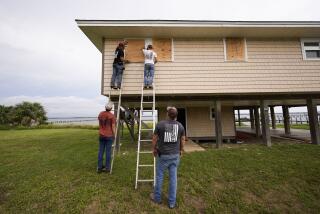Our Do-Gooder Delusions in Afghanistan Are in for a Shock
In framing his anti-terrorism policy, President Bush does well to emphasize that his quarrel is not with the Afghan people. It is dangerous to tie the humanitarian response to the needs of Afghanistan closely to the international anti-terrorism campaign and to Afghan politics.
For some time, aid agencies have been preparing for a massive humanitarian crisis. The major challenge, however, has been less the scale of the food shortages than the problem of reaching the people in need.
A decade of Russian occupation followed by another of internecine strife have left the country’s infrastructure in shambles. Now that military action has commenced, reaching people within Afghanistan will become much more difficult. The flow of refugees into neighboring countries, which policymakers had sought to avoid, will also increase.
The logistics of relief efforts within Afghanistan will be complicated by politics. Aid work had been proceeding in the limited amount of territory occupied by the Northern Alliance, whose members welcome outside aid and hope for political and military support. For years, by contrast, the Taliban has made aid work difficult in the larger areas it controls. The humanitarian principle that assistance be provided according to the severity of need, wherever the needy are located, will be sorely tested.
If truth is the first casualty of war, the second is often the neutrality of relief operations. The record of aid neutrality in Afghanistan is not reassuring. During the 1980s, most relief work was an extension of U.S. foreign policy, plying Afghan refugees and “freedom fighters” with food and other essentials. Bush’s recent statement that “we are a compassionate nation, but our compassion is limited” continues to tie U.S. aid to a clear political agenda-and politicization can do substantial harm.
Given their earlier experience with aid that was driven by political objectives, Taliban officials are unlikely to ease the way for humanitarian activities. In the wake of U.S. airstrikes, the reported attack on a UNICEF field office in Quetta, a city in Pakistan along the Afghan border, is a harbinger of trouble.
If the Taliban remains in power, it also may become difficult to sustain aid levels as time goes by. The record of humanitarian programs in pariah states is not reassuring. Sanctions on Serbia and Iraq led to reduced aid, undercutting the health of civilians and the efficacy of outside succor.
International aid groups also face difficulty responding to Afghan needs without reducing life-saving activities elsewhere. Aid workers in southern Africa, where programs are already undersubscribed, see their work falling still further off the international screen. Even countries in which the U.S. has been the largest single donor-Ethiopia and Eritrea, for example-may experience cutbacks as aid workers are redeployed and food already on the high seas is diverted to ports in southern Asia.
In several countries, fear of reprisals against Western aid workers has already reduced activities.
Yet not all the ripples throughout the international community are likely to be negative.
U.S. assistance policy may come to reflect a more genuine multilateralism, which is essential to the success of the administration’s anti-terrorism initiative. And U.S. delusions of humanitarian compassion could be in for an overdue slap of reality. Active concern for Afghanistan and the causes of terrorism-poverty, injustice, isolation-might conceivably lift the global levels of U.S. economic aid, which have been lagging for years.
Terrorism and its terrible human costs may also prove a learning experience for many Americans.
If, as American writer Ambrose Bierce is said to have observed, “war is God’s way of teaching Americans geography,” Sept. 11 represents a wake-up call. Spurred by the devastation that we ourselves have experienced, we should move quickly to place common humanity and shared security in the forefront of U.S. policies at home and abroad.
Larry Minear is director of the Humanitarianism and War Project at Tufts University’s Feinstein International Famine Center.
More to Read
Sign up for Essential California
The most important California stories and recommendations in your inbox every morning.
You may occasionally receive promotional content from the Los Angeles Times.










